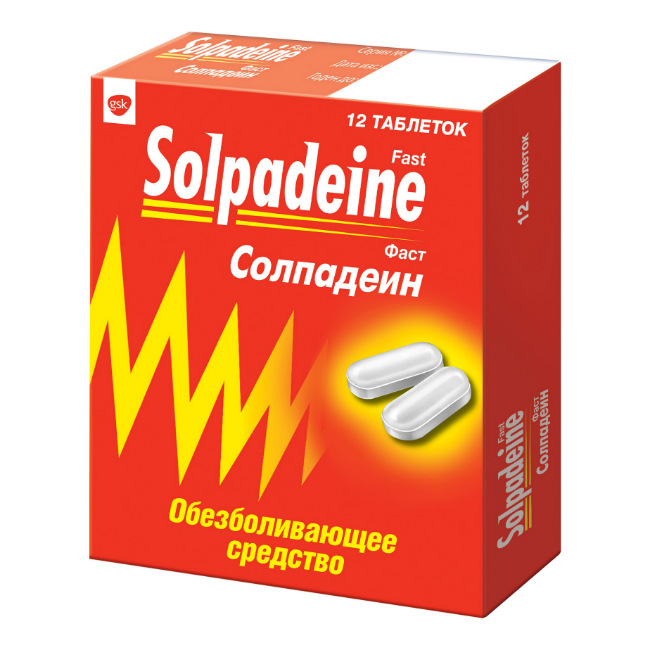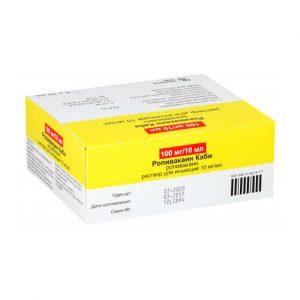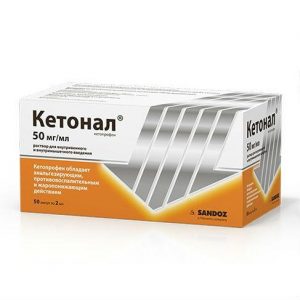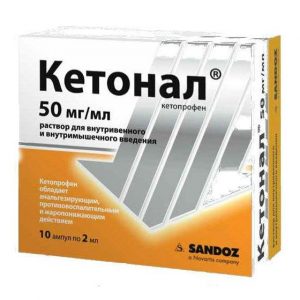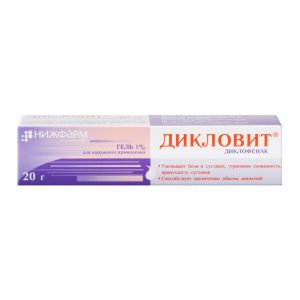Description
Briefly about the product
Solpadein Fast in a soluble form has an analgesic effect for migraines, headache, toothache and periodic pain. *
Solpadein Fast – directed action against pain!
* Instructions for medical use, RU No Ñ N 014417/01 dated 11/18/2008
Description
Tablets, film-coated, white, capsule-shaped with a flat edge, embossed with a triangle sign and + on one side of the tablet.
Latin name
Solpadeine fast
Release form
Film-coated tablets.
Pharmacological action
Combined antipyretic analgesic, contains a combination of two active ingredients: paracetamol and caffeine. It has an antipyretic and analgesic effect.
Paracetamol blocks COX in the central nervous system, affecting the centers of pain and thermoregulation (in inflamed tissues, cellular peroxidases neutralize the effect of paracetamol on COX), which explains the almost complete absence of anti-inflammatory effect.
The absence of influence on the synthesis of prostaglandins in peripheral tissues leads to the absence of a negative effect on water-salt metabolism (sodium and water retention) and gastrointestinal mucosa.
Caffeine stimulates the psychomotor centers of the brain, has an analeptic effect, enhances the effect of analgesics, eliminates drowsiness and a feeling of fatigue, increases physical and mental performance.
Indications
headache
migraine
toothache
lower back pain
neuralgia
muscle and rheumatic pain
painful menstruation
sore throat
symptomatic treatment for colds and flu (symptomatic treatment for colds.
Contraindications
severe hepatic impairment
severe renal impairment
arterial hypertension
glaucoma
sleep disturbance
epilepsy
children under 12 years of age
hypersensitivity to the drug.
Caution is advised to use the drug for benign hyperbilirubinemia (including Gilbert syndrome), viral hepatitis, alcoholic liver damage, glucose-6-phosphate dehydrogenase deficiency, alcoholism.
Use during pregnancy and lactation
The drug Solpadein Fast contains caffeine.
When taking caffeine, there is a high risk of having a baby with a low body weight, the risk of spontaneous abortion.
Once in breast milk, caffeine can have a stimulating effect on a breast-fed baby.
Solpadein Fast should not be used during pregnancy and lactation (breastfeeding).
Special instructions
If you do not see an improvement in the condition when taking the drug or if the headache becomes constant, you should consult a doctor.
While taking the drug, it is not recommended that you consume excess caffeinated foods (including tea, coffee), because this can lead to anxiety, anxiety, irritability, insomnia, headache, gastrointestinal disorders, tachycardia, cardiac arrhythmias.
In cases of prolonged use in high doses, monitoring of the blood picture is necessary.
Glutathione deficiency due to eating disorders, cystic fibrosis, HIV infection, starvation, and malnutrition makes it possible to develop severe liver damage with small overdoses of paracetamol (5 g or more).
The drug should not be taken concomitantly with other paracetamol-containing drugs.
In order to avoid toxic liver damage, paracetamol should not be combined with alcoholic beverages, and should also be taken by people prone to chronic alcohol consumption.
Patients with atopic bronchial asthma, hay fever, have an increased risk of allergic reactions.
In patients with renal and insufficiency, the drug should be used with caution and only after consulting a doctor.
When taking the drug in patients with non-alcoholic liver cirrhosis, there is a high risk of overdose.
When conducting tests to determine uric acid and blood glucose, you should tell your doctor about taking the drug.
Against the background of taking the drug, it is possible to change the results of doping control analyzes of athletes.
Composition of
Active ingredients:
– paracetamol 500 mg
– caffeine 65 mg.
Excipients:
pregelatinized starch 50 mg,
corn starch 41.4 mg,
povidone 2 mg,
potassium sorbate 0.6 mg,
talcum 15 mg,
stearic acid 5 mg sodium sbrlkp gell 5 mg,
triacetin 1 mg.
Dosage and administration
soluble tablets Solpadein Fast before oral administration should be dissolved in at least 100 ml (half a glass) of water. Adults (including the elderly) and children over 12 years of age are prescribed 1-2 tablets. 3-4 times / day, if necessary. The interval between doses is at least 4 hours. The maximum single dose is 2 tablets., the maximum daily dose is 8 tablets.
The drug is not recommended for more than five days as an anesthetic and more than three days as an antipyretic without prescribing and monitoring a doctor.
An increase in the daily dose of the drug or the duration of treatment is possible only under the supervision of a doctor.
Side effects
At recommended doses, the drug is usually well tolerated. Determination of the frequency of side effects: very common ( 1/10), often ( 1/100 and <1/10), infrequent ( 1/1000 and <1/100), rare ( 1 / 10,000 and <1 / 10,000), very rare ( 1/100,000 and <1 / 10,000). The following side effects have been identified spontaneously during post-registration administration of the drug. Paracetamol Allergic reactions: very rare – skin rash, angioedema (Quincke’s edema), Stevens-Johnson syndrome, anaphylaxis. From the hematopoietic system: very rarely – leukopenia, thrombocytopenia, methemoglobinemia, agranulocytosis, hemolytic anemia. From the respiratory system: very rarely – bronchospasm (in patients with hypersensitivity to acetylsalicylic acid and NSAIDs). From the hepatobiliary system: very rarely – impaired liver function. Prolonged use at high doses increases the likelihood of hepatotoxic action, nephrotoxicity, and pancytopenia. Also, in cases of prolonged use in high doses, blood picture control is required. Caffeine Possible: dyspeptic phenomena (including nausea, epigastric pain), increased excitability, dizziness, sleep disorders, tachycardia. With excessive use of caffeine-containing foods (including tea, coffee) while taking the drug may cause anxiety, anxiety, irritability, insomnia, headache, disorders of the digestive system, tachycardia, cardiac arrhythmia. If any of these side effects occur, you should stop taking the medication and consult your doctor immediately. Drug Interaction With regular administration for a long time, the drug increases the effect of indirect anticoagulants (warfarin and other coumarins), which increases the risk of bleeding. Episodic intake of a single dose of the drug has no significant effect on the effect of indirect anticoagulants. The drug enhances the action of MAO inhibitors. Barbiturates, carbamazepine, phenytoin, primidone, ethanol, rifampicin, phenylbutazone, St. John’s wort, tricyclic antidepressants and other inducers of microsomal oxidation increase the production of hydroxylated active metabolites, causing the possibility of severe liver damage with small overdoses of paracetamol (5 g or more). Microsomal oxidation inhibitors (cimetidine) reduce the risk of hepatotoxic action. Under the influence of paracetamol, the elimination time of chloramphenicol is increased 5-fold. Caffeine accelerates the absorption of ergotamine. Concurrent administration of paracetamol and alcoholic beverages increases the risk of hepatotoxic effects and acute pancreatitis. Metoclopramide and domperidone increase, and cholestyramine reduces the absorption rate of paracetamol. The drug may reduce the effectiveness of uricosuric drugs. Overdose Symptoms, due to paracetamol: pallor of the skin, nausea, vomiting, anorexia, stomach pain within 1-2 days may show signs of liver damage (pain in the liver, increased activity of liver enzymes). Perhaps a violation of carbohydrate metabolism and signs of metabolic acidosis. In adult patients, liver damage develops after taking more than 10 g of paracetamol. If there are factors affecting the toxicity of paracetamol to the liver, liver damage is possible after taking paracetamol in an amount of 5 g or more. In severe cases of overdose, encephalopathy, bleeding, hypoglycemia, cerebral edema, up to a fatal outcome, can develop. Perhaps the development of acute renal failure with acute tubular necrosis, the characteristic signs of which are pain in the lumbar region, hematuria, proteinuria, while severe liver damage may be absent. There are reports of cases of heart rhythm disturbances, pancreatitis. Treatment: in case of suspicion of an overdose, even in the absence of pronounced first symptoms, it is necessary to stop the use of the drug and immediately seek medical help. Within 1 hour after an overdose, gastric lavage and administration of enterosorbents (activated carbon, polyphepan) are recommended. The concentration of paracetamol in the blood plasma should be determined, but not earlier than 4 hours after an overdose (earlier results are unreliable). Administration of acetylcysteine within 24 hours after an overdose. The maximum protective effect is provided during the first 8 hours after an overdose, over time, the effectiveness of the antidote drops sharply. If necessary, injected acetylcysteine iv. In the absence of vomiting before the patient enters the hospital, methionine may be used. The need for additional therapeutic measures (further administration of methionine, iv administration of acetylcysteine) is determined depending on the concentration of paracetamol in the blood, as well as on the time elapsed after its administration. Treatment of patients with serious impaired liver function 24 hours after taking paracetamol should be carried out in conjunction with specialists from a poison control center or specialized liver disease department. Symptoms due to caffeine: epigastric pain, vomiting, frequent urination, tachycardia, arrhythmia, CNS stimulation (insomnia, anxiety, agitation, anxiety, increased neuro-reflex excitability, tremors and convulsions). However, it should be borne in mind that the appearance of clinically significant symptoms of an overdose of caffeine when taking this drug is always associated with severe liver damage due to an overdose of paracetamol. Treatment: no specific antidote. Treatment includes supportive activities, such as drinking plenty of fluids and maintaining vital signs. Within 1 hour to 4 hours after an overdose, the intake of activated carbon is recommended. In order to reduce the effects of caffeine overdose on central nervous system function, the introduction of IV sedatives is recommended. Storage Conditions Keep out of the reach and sight of children at temperatures not exceeding 25 ° C. Expiration 4 years. Terms of sales from pharmacies Terms of a stay from pharmacies Without prescriptions Famar S.A., Greece
